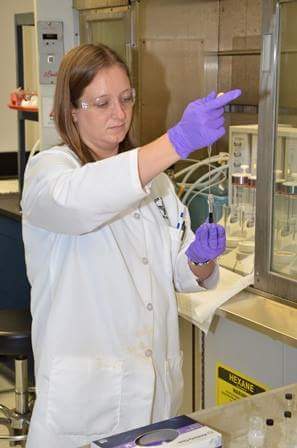Laboratory Technician
Laboratory technicians conduct necessary quality testing to ensure water meets high standards to protect public health
Laboratory technicians provide data that determines how well treatment processes are working. They analyze water and biosolids on a physical and biological level. They also support toxicity testing and are considered the first professional level of the analytical team in many water laboratories. They usually focus on compliance testing (making sure regulations are met), monitoring contaminants from industry, and helping inform operational staff to make internal decisions.
Knowledge, Skills, and Abilities
Knowledge of:
- Analytical methods
- Mathematics and environmental science
- Lab safety
- Maintenance and repair of analytical equipment
- Professional ethics
Skill in:
- Lab techniques (may range from proper pipetting to gas chromatography-mass spectrometry)
- Problem solving
- Time management
Ability to:
- Work precisely, with steady hands
- Communicate clearly, verbally and in writing
- Keep detailed records
- Keep organized
Education and Training
Different laboratories have different requirements, but a college degree in a scientific field is usually preferred. Fields such as chemistry, biology, environmental science or toxicology are especially relevant. Interest or experience in environmental work are considered a plus. Employers may prefer to hire those with relevant analyst certifications from organizations such as the Association of Boards of Certification, American Water Works Association, or American Academy of Environmental Engineers and Scientists. To become a supervisor, additional education or experience may be required.
Let's Get Started!
We understand that finding the perfect career can be both exciting and overwhelming. With many different paths to choose from and education, training, and certification requirements that vary by region, it’s hard to know where to start. Work for Water is here to help! Visit our Get Started map to learn the specifics to finding a job in your region, links to your local certification agency, training opportunities, scholarships, and other local resources to help you launch your career in water.
Get started
